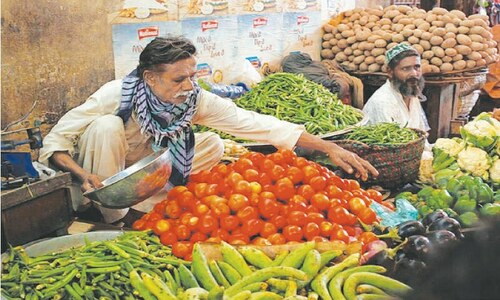ISLAMABAD: Food prices have pushed short-term inflation higher after a week of respite, with salt, bananas, tomatoes and powdered milk rising at the fastest pace, official data showed on Friday.
The Sensitive Price Indicator (SPI), used to measure weekly inflation, increased to 0.35 per cent for the week ending Oct 20 over the preceding seven days.
However, the weekly inflation was still 27pc when compared to the same period a year ago, driven by food items like onions and tomatoes and non-food items like diesel, petrol and washing soap that have got expensive this year, according to data released by the Pakistan Bureau of Statistics.
The annual increase in short-term inflation has been on the decline for some time, falling from a peak of 45.5pc in the week ending Sept 1. Other notable mentions: 44.6pc (Aug 25), 42.7pc (Sept 8), 42.3pc (Aug 18). Prices rose at such a fast pace recently on the back of surging food and fuel prices.
Annual increase in SPI still above 27pc due to expensive vegetables, fuel
A World Bank report estimated that the average consumer index-based inflation in Pakistan would rise to 23 per cent in the current fiscal year from 12.2pc a year ago due to higher domestic energy prices, flood disruptions and a weaker rupee.
The SPI monitors the prices of 51 essential items based on a survey of 50 markets in 17 cities across the country. During the week under review, the prices of 23 out of 51 items increased, 14 decreased, and 14 remained stable.
In the food group, the items that saw the highest week-on-week increase in prices include powdered salt (up 4.84pc), bananas (3.8pc), tomatoes (2.6pc), powdered milk (2.2pc), tea (1.24pc), fresh milk (1.23pc), cooked beef (1.2pc) and Irri-6/9 rice (1.02pc).
As for non-food items, long cloth (2.21pc), georgette (1.9pc), firewood (1.57pc) and shirting (1.33pc) saw the highest weekly rise in prices.
On the other hand, commodities whose prices went down the most included pulse masoor (3.63pc), chicken (3.49pc), wheat flour (1.95pc), potatoes (1.88pc), pulse mash (1.74pc), pulse moong (1.13pc) and LPG (0.45pc).
On a year-on-year basis, the items whose prices jumped the most included onions (170pc), tomatoes (113pc), diesel (74.5pc), pulse gram (68pc), petrol (62.8pc), pulse masoor (56.9pc), five-litre cooking oil pack (56.3pc), washing soap (55.4pc), pulse moong (53.7pc), 2.5kg pack of vegetable ghee (53.3pc), mustard oil (53.2pc), pulse mash (52.7pc), gents sponge chappal (52.2pc) and 1kg pack of vegetable ghee (49.9pc).
The State Bank of Pakistan has been tightening its monetary policy to contain surging inflation and a rapidly falling rupee. Since September last year, the central bank has increased the policy rate by eight percentage points to 15pc, the highest rate since the 2008 global financial crisis.
Published in Dawn, October 22th, 2022














































